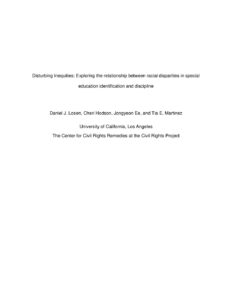Abstract
Our study examined the relationship between the Native American community’s recommendations for improving outcomes for American Indian/Alaska Native (AI/AN) students and school level practices in Oregon. We merged data on teacher practices from the 2009 National Indian Education Study (NIES) with data reflecting disciplinary exclusions. Our unweighted sample consisted of 40 elementary schools, 40 middle schools, <10 high schools, and 10 K-8/12 schools. Results indicated that the majority of teachers did not participate in recommended professional development nor did they integrate Native culture into instruction. Although correlations between participation in professional development and use of Native culture were significant, linear regression outcomes indicated no significant association between school level practices and disciplinary exclusion patterns of AI/AN students. Follow-up analyses of K-8/12 schools, which had the lowest rates of disciplinary exclusions for AI/AN students, indicated that greater AI/AN enrollment density was associated with lower out-of-school suspension rates. Based on our analyses and current efforts in Oregon to improve educational outcomes for AI/AN students we recommended greater emphasis on (a) disaggregating discipline data by student race, (b) meaningful collaboration between state departments of education and Native community leaders, (c) schools’ accountability for reaching out to Native parents and community members, and (d) sharing disaggregated data with all relevant stakeholders.
In compliance with the UC Open Access Policy, this report has been made available on eScholarship:
